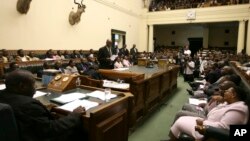Finance Minister Patrick Chinamasa on Wednesday told international development partners to channel aid through the government saying Harare will not be held accountable for funds provided through unofficial means if anything went wrong.
Chinamasa told an inaugural government of Zimbabwe and development partners meeting, called to review the country’s aid co-ordination processes, that Zimbabwe will ensure aid funding received from its partners is not abused.
The donor community has over the past decade largely avoided channeling aid funding through the government with most funds being given to international or United Nations agencies and civil groups.
Chinamasa said Wednesday’s dialogue is aimed at establishing a transparent way in which aid is channeled and used.
United Nations resident co-ordinator and United Nations Development Program resident representative, Bishow Parajuli, told the meeting that strengthening aid coordination and development will improve accountability as well as help in identifying and addressing development needs and gaps in areas such as poverty and food security.
Parajuli said strong aid co-ordination will provide a robust platform to achieve development.
This, he said, has been demonstrated through the Zimbabwe-United Nations Development assistance framework which he said has achieved enormous results such as doubling the immunization rate of children under five and the successful completion of the constitution-making process.
Following Zimbabwe’s fallout with the international community, most donor funds were channeling aid through local non- governmental organizations, some of which are now being accused of abusing the millions of dollars they received.
But following the lifting of some of the sanctions targeting Zimbabwe by the European Union (EU), some organizations such as the EU will provide $270 million in aid funds through the government of Zimbabwe for socio-economic development projects over the next five years.
U.S. Ambassador to Zimbabwe, Bruce Wharton was among many western dignitaries that attended the meeting with Chinamasa.
The U.S. government and other western countries have cited several factors for their refusal to give aid through the government. These include controversial economic policies, fears of corruption, and widely documented human rights violations by President Robert Mugabe's government.
The U.S. is the leading provider of humanitarian assistance to Zimbabwe. Through the U.S. Agency for International Development (USAID), President's Emergency Plan for AIDS Relief (PEPFAR) and the Centers for Disease Control and Prevention (CDC), in Zimbabwe, the U.S. funds food aid, HIV/AIDS prevention programs, and programs to promote democracy, good governance and economic growth.
Last year alone, USAID provided nearly $25 million in emergency food aid.
Meanwhile, Deputy President Emmerson Mnangagwa and Home Affairs Deputy Minister, Ziyambi Ziyambi, on Wednesday said efforts to locate missing democracy activist, Itayi Dzamara, have so far yielded nothing.
Responding to questions from Kuwadzana East lawmaker, Nelson Chamisa of the Movement for Democratic Change formation led by Morgan Tsvangirai, Mr. Mnangagwa said the government was concerned that Dzamara had not been found and appealed to anyone with information on his whereabouts to contact the police.
TELECEL ZIMBABWE
At the same time, Information and Communication Minister, Supa Mandiwanzira, told parliament that telecommunications company, Telecel Zimbabwe, whose operating license was canceled last week, has approached the High Court seeking redress.
Telecel’s license was canceled for failing to comply with the Postal and Telecommunications Act which stipulates that 51 percent of shares in foreign-owned companies and cellular firms in particular, must be owned by locals.
The government says Telecel has been in breach of this law for the last 15 years.





